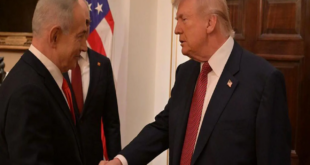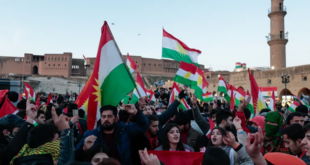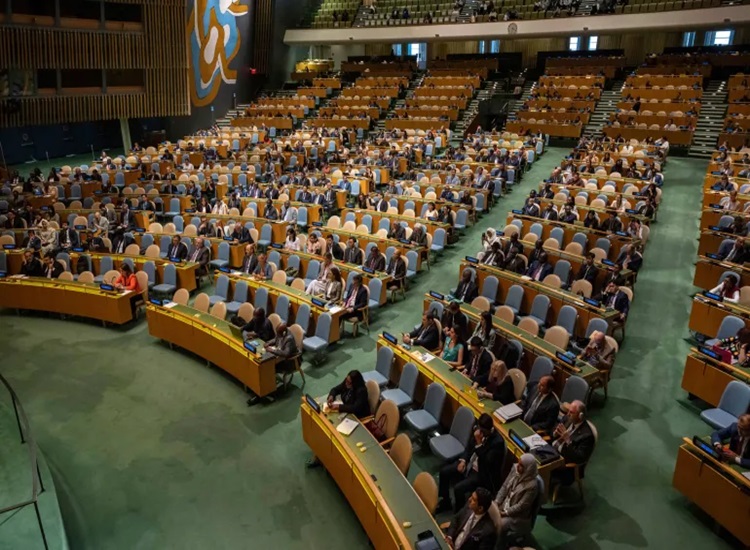
The resolution passed but the vote demonstrated persistent flouting international law in favour of strategic interest.
The death toll from an Israeli air attack in Beirut’s southern suburbs has risen to 37 people, including three children and seven women, Lebanon’s health minister says.
On September 18, the United Nations General Assembly (UNGA) adopted a resolution calling for Israel to terminate its illegal occupation of Palestinian territory within one year. The vote, which concluded with 124 in favour, 12 against, and 43 abstained, has been interpreted by some as a significant triumph for Palestinian advocacy.
Yet, the fact that 54 countries (excluding Israel) – constituting about 28 percent of all member states – did not back the resolution cannot be overlooked. It not only signifies a failure of moral courage but also underscores a pervasive hypocrisy that continues to shape global governance. In fact, it reflects continuing efforts to erode the international regime in order to ensure impunity for Israel.
The resolution in question demanded that Israel “brings to an end without delay its unlawful presence in the Occupied Palestinian Territory”. It reiterated the findings of the International Court of Justice (ICJ), which ruled in July that Israel’s occupation was illegal, that its settlements on occupied Palestinian land are also illegal and must be dismantled, and that it needs to pay reparations for damages incurred by the Palestinians.
International law is quite clear on the question of occupation: it is a criminal act. A consensus among international scholars underscores that an occupier cannot invoke the right of self-defence against the people it occupies – an argument Israel has employed to justify its nefarious genocidal actions.
In the context of this ruling by the World Court, voting against and abstaining from voting on the UNGA resolution cannot be dismissed as mere political neutrality. By choosing not to support a resolution that re-affirms the illegality of the Israeli occupation, these nations implicitly endorse Israel’s actions and contribute to the perpetuation of a status quo marked by brutal oppression and suffering. They also openly disregard and thus attack the provisions of international law.
It is important to remember that this vote came amid a continuing Israeli aggression against Gaza and the West Bank, in which nearly 42,000 Palestinians – the majority of them women and children – have been killed and more than 100,000 injured. In January, the ICJ issued a preliminary ruling that Isreal is “plausibly” violating the Genocide Convention with its actions in Gaza. This genocidal violence is a direct consequence of the decades-long illegal Israeli occupation of Palestinian land.
The October 7 attack last year by Hamas cannot be viewed in isolation. It is rooted in decades of brutal occupation that has left Palestinians trapped in what many describe as the world’s largest open-air prison, where systemic oppression, displacement, and violence have defined millions of Palestinian lives. Understanding this context is essential to addressing the underlying issues and moving toward a just and lasting resolution that honours the dignity and humanity of all affected.
One of the 12 countries that voted against the resolution – the United States – has been a long-time supporter of the Israeli occupation, sending billions worth of weapons to its military before and after October. For its role in arming Israel, the US has been repeatedly accused of complicity in Israeli war crimes and crimes against humanity.
Strangely, the US representative to the UN entered a “no” vote despite the fact that Judge Sarah Cleveland, who represents the US at the ICJ, voted in favour of all the court’s opinions in the July ruling.
What makes the US position even more problematic is that it has had the exact opposite stance on occupations elsewhere. In 2022, when Russia launched a full-scale invasion of Ukraine and occupied parts of its territory, Washington was at the forefront of global condemnation, sending billions in military and financial aid to the Ukrainian army. This has set a troubling double standard that other countries allied with the US have also followed.
The United Kingdom, for example, expressed “considerable concerns” about the January ICJ ruling and rejected genocide allegations against Israel. On September 18, it chose to abstain. Despite its own legal advisers warning that British weapons could be used for human rights violations in Gaza, the British government has continued its arms shipments to the Israeli army, suspending just 30 out of 350 arms export licences.
Like Washington, London has also extended significant military support for Ukraine in its fight against Russian occupation and wholeheartedly backed investigations into war crimes committed by Russian forces.
Germany, which also abstained on September 18, is another example of a country with a troubling position. As a key supplier of arms to Israel, Germany faces serious allegations of facilitating the commission of genocide, complicating its moral standing and raising questions about its commitment to human rights. Its government has announced plans to intervene in the main hearing of the genocide case against Israel at the ICJ, categorically rejecting the accusations of genocide without substantial justification.
While trying to block legal proceedings against Israel, Germany has accelerated investigations launched by its own justice system into war crimes committed in Ukraine.
Various other countries in Europe, Latin America, Asia and the Pacific – mostly US and NATO allies – have also either voted against the UNGA resolution or abstained, putting geopolitical considerations above international law and ethics.
The hypocrisy inherent in these geopolitical alliances raises critical questions about the integrity of the global legal framework. Why is it that violations committed by Israel, an ally of powerful Western nations, are met with silence or insufficient condemnation and others are not? This inconsistency not only deepens the divisions between the West and the Global South, but also damages the legitimacy of international law and its ability to prevent atrocities.
The more Israel is shielded by these countries, the more it flouts international law without fear of consequences and the more brutal and deadly its abuses become. And its violations do not only affect the Palestinian population. This pattern of impunity undermines the foundational principles of justice and accountability and encourages others to engage in such crimes.
The abstention of 43 countries and the opposition from 11 others regarding the UNGA resolution send a clear message to the world: there are “no rules”. This alarming trend suggests that nations with powerful militaries can act unilaterally, disregarding international law without consequence. If we fail to halt this erosion of the legal regime, we risk descending into a world governed by the “law of the jungle”.
Such a breakdown of international law would have catastrophic implications for human civilisation. It would foster a climate where the powerful can trample on the rights of the weak, perpetuating cycles of violence and oppression. The hypocrisy evident in the global response to the Palestinian plight exemplifies this dangerous disregard for justice and accountability. As these 54 countries continue to turn a blind eye to grave violations, the foundations of global order are threatened.
To restore faith in international law, countries must prioritise human rights over strategic interests. This requires a unified front from the international community. Nations must hold each other accountable for their actions and speak out against violations, regardless of political affiliations or alliances. A true commitment to justice necessitates that the principles of international law be applied consistently and without bias.
Only through decisive action can the ideals of international law be upheld and the world saved from a dark, lawless future.
Israel-Hezbollah attacks resume after Lebanon says 37 killed in Israeli strike on Beirut
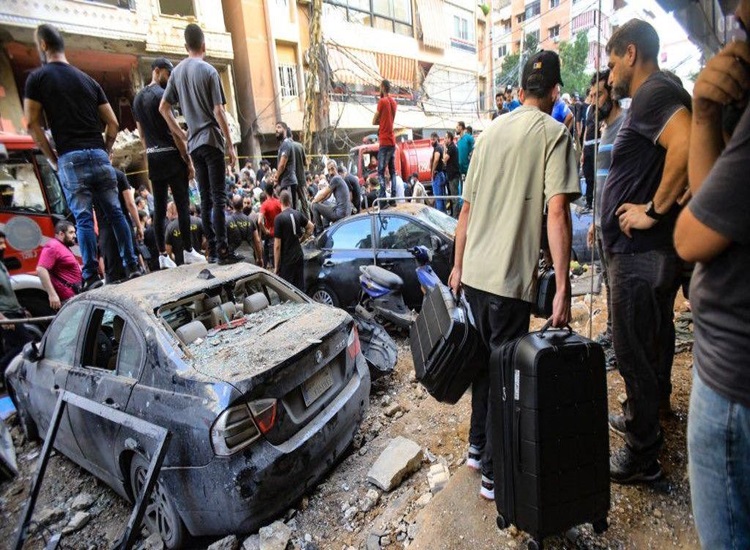
Here’s a look at today’s main developments:
The death toll from an Israeli air attack in Beirut’s southern suburbs has risen to 37 people, including three children and seven women, Lebanon’s health minister says.
The strike, which wrecked two buildings in the Lebanese capital’s Dahiya district during rush hour on Friday, also injured more than 60 people, Health Minister Firass Abiad told a news conference on Saturday.
Cross-border attacks between Hezbollah and Israel have resumed. Hezbollah says it has fired rockets at two military positions in northern Israel, while the IDF said it was attacking Hezbollah targets in Lebanon
The number of people killed in the Israeli strike on Beirut on Friday has risen to 37, the Lebanese health ministry says, as search and rescue efforts in Dahieh continue.
The Israeli Defense Forces (IDF) said it killed 16 Hezbollah members in the strike, including 12 senior commanders.
A news conference by Lebanon’s health ministry revealed this morning that 152 people are still in a critical condition after the device explosions on Tuesday and Wednesday. It also said the number of those killed over the two days of explosions has risen from 37 to 39.
Away from Lebanon in Gaza, the Hamas-run health ministry says at least 22 people, « mostly » children and women, have been killed following a strike on a school in Gaza city housing displaced people.
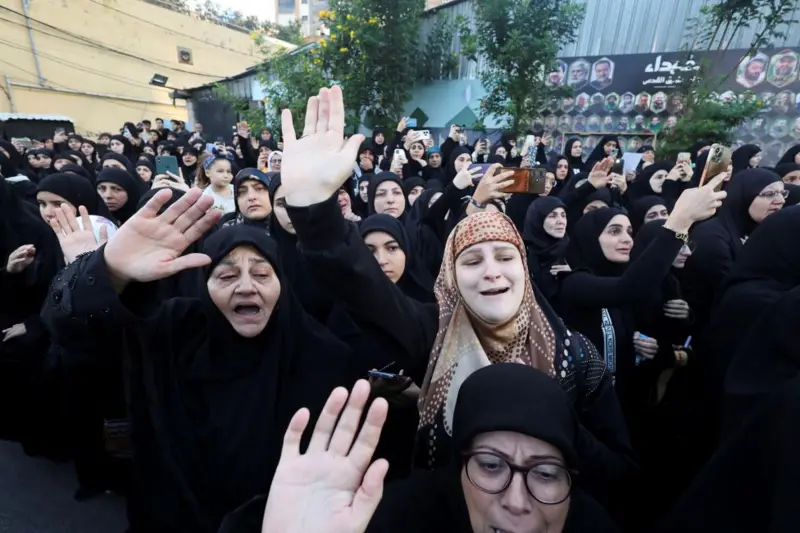
World Opinions + BBC News + Aljazeera News




 World Opinion | Alternative Média زوايا ميادين | صوت من لا صوت له Débats De Société, Questions, Opinions et Tribunes.. La Voix Des Sans-Voix | Alternative Média
World Opinion | Alternative Média زوايا ميادين | صوت من لا صوت له Débats De Société, Questions, Opinions et Tribunes.. La Voix Des Sans-Voix | Alternative Média


